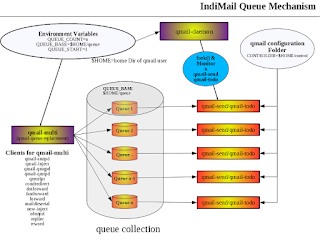The first step is to write the service configuration file for IndiMail as /lib/systemd/system/indimail.service
[Unit]
Description=IndiMail Messaging Platform
After=local-fs.target network.target
[Service]
ExecStart=/var/indimail/bin/svscanboot /service
ExecStop=/etc/init.d/indimail stop
Restart=on-failure
Type=simple
[Install]
WantedBy=multi-user.targetIn Fedora 15, upstart has been replaced by a service called systemd. Due to improper rpm package upgrade scripts, some system services previously enabled in Fedora 14, may not be enabled after upgrading to Fedora 15. To determine if a service is impacted, run the systemctl status command as shown below.
# systemctl is-enabled indimail.service && echo "Enabled on boot" || echo "Disabled on boot"To enable indimail service on boot, run the following systemctl command
# systemctl enable indimail.service# service indimail start (to start indimail)# service indimail stop (to stop indimail)# /var/indimail/bin/initsvc -on (to enable indimail service)# /var/indimail/bin/initsvc -off (to disable indimail service)# systemctl status indimail.serviceindimail.service - IndiMail Messaging Platform
Loaded: loaded (/lib/systemd/system/indimail.service)
Active: active (running) since Wed, 20 Jul 2011 18:18:35 +0530; 10min ago
Main PID: 4353 (svscanboot)
CGroup: name=systemd:/system/indimail.service
├ 4353 /bin/sh /var/indimail/bin/svscanboot
├ 4356 /var/indimail/bin/svscan /service
├ 4357 supervise log
├ 4358 supervise clamd
├ 4359 supervise log
├ 4360 supervise freshclam
├ 4361 supervise log
├ 4362 supervise qmail-send.25
├ 4363 supervise log
├ 4364 supervise qmail-pop3d-ssl.995
├ 4365 supervise log
├ 4366 supervise proxy-imapd-ssl.9143
├ 4367 supervise log
├ 4368 supervise qmail-poppass.106
├ 4369 supervise log
├ 4370 supervise proxy-imapd.4143
├ 4371 supervise log
├ 4372 supervise proxy-pop3d-ssl.9110
├ 4373 supervise log
├ 4374 supervise qmail-smtpd.465
├ 4375 supervise log
├ 4376 supervise inlookup.infifo
├ 4377 supervise log
├ 4378 supervise qmail-smtpd.366
├ 4379 supervise log
├ 4380 supervise proxy-pop3d.4110
├ 4381 supervise log
├ 4382 supervise slapd.389
├ 4383 supervise log
├ 4384 supervise qmail-smtpd.587
├ 4385 supervise log
├ 4386 supervise pwdlookup
├ 4387 supervise log
├ 4388 supervise qmail-pop3d.110
├ 4389 supervise log
├ 4390 supervise qmail-qmtpd.209
├ 4391 supervise log
├ 4392 supervise fetchmail
├ 4393 supervise log
├ 4394 supervise qscanq
├ 4395 supervise log
├ 4396 supervise qmail-smtpd.25
├ 4397 supervise log
├ 4398 supervise mysql.3306
├ 4399 supervise log
├ 4400 supervise qmail-spamlog
├ 4401 supervise log
├ 4402 supervise qmail-qmqpd.628
├ 4403 supervise log
├ 4404 supervise qmail-imapd-ssl.993
├ 4405 supervise log
├ 4406 supervise indisrvr.4000
├ 4407 supervise log
├ 4408 supervise qmail-imapd.143
├ 4409 supervise log
├ 4410 supervise greylist.1999
├ 4411 supervise log
├ 4412 /var/indimail/bin/multilog t /var/log/indimail/fre...
├ 4413 qmail-daemon ./Maildir/
├ 4414 /var/indimail/bin/tcpserver -v -H -R -l 0 -x /var/...
├ 4415 /var/indimail/bin/tcpserver -v -c /service/qmail-p...
├ 4416 /var/indimail/bin/multilog t /var/log/indimail/pro...
├ 4417 /var/indimail/bin/multilog t /var/log/indimail/pop...
├ 4418 /var/indimail/bin/multilog t /var/log/indimail/pro...
├ 4419 /var/indimail/bin/multilog t /var/log/indimail/pro...
├ 4420 /var/indimail/bin/multilog t /var/log/indimail/pop...
├ 4421 /var/indimail/bin/tcpserver -v -c /service/qmail-p...
├ 4422 /var/indimail/bin/multilog t /var/log/indimail/pro...
├ 4424 /var/indimail/bin/tcpserver -v -c /service/proxy-p...
├ 4425 /var/indimail/bin/multilog t -* cleanq starting -*...
├ 4426 /var/indimail/bin/tcpserver -v -h -R -l 0 -x /var/...
├ 4427 /var/indimail/bin/tcpserver -v -c /service/proxy-i...
├ 4428 /var/indimail/sbin/inlookup -i 5
├ 4429 /var/indimail/bin/multilog t /var/log/indimail/mys...
├ 4430 /var/indimail/bin/multilog t /var/log/indimail/smt...
├ 4431 /var/indimail/sbin/nssd -d notice
├ 4432 /var/indimail/bin/tcpserver -v -c /service/qmail-i...
├ 4433 /var/indimail/bin/multilog t /var/log/indimail/pwd...
├ 4434 /var/indimail/bin/multilog t /var/log/indimail/smt...
├ 4435 /var/indimail/bin/multilog t /var/log/indimail/pop...
├ 4436 /var/indimail/bin/tcpserver -v -c /service/proxy-i...
├ 4437 /var/indimail/bin/multilog t /var/log/indimail/inl...
├ 4438 /usr/bin/perl /var/indimail/bin/greydaemon -w /var...
├ 4439 /var/indimail/bin/tcpserver -v -c /service/qmail-i...
├ 4440 /var/indimail/bin/tcpserver -v -h -R -l 0 -x /var/...
├ 4441 /var/indimail/bin/multilog t /var/log/indimail/ima...
├ 4442 /var/indimail/bin/tcpserver -v -H -R -l 0 -x /var/...
├ 4443 /var/indimail/bin/multilog t /var/log/indimail/gre...
├ 4444 /usr/local/mysql/libexec/mysqld --defaults-file=/v...
├ 4445 /var/indimail/bin/tcpserver -v -H -R -l 0 -x /var/...
├ 4446 /var/indimail/bin/qmail-cat /tmp/spamfifo
├ 4447 /var/indimail/bin/multilog t /var/log/indimail/fet...
├ 4448 /var/indimail/bin/multilog t /var/log/indimail/qmq...
├ 4449 /var/indimail/bin/multilog t /var/log/indimail/smt...
├ 4450 /var/indimail/bin/multilog t /var/log/indimail/qmt...
├ 4451 /var/indimail/bin/tcpserver -v -H -R -l 0 -x /var/...
├ 4452 /var/indimail/sbin/indisrvr -i 0 -p 4000 -b 40 -n ...
├ 4453 /var/indimail/bin/multilog t /var/log/indimail/ind...
├ 4454 /var/indimail/bin/multilog t /var/log/indimail/smt...
├ 4455 /var/indimail/bin/multilog t /var/log/indimail/cla...
├ 4456 /var/indimail/bin/multilog t /var/log/indimail/svs...
├ 4457 /var/indimail/sbin/clamd
├ 4458 /var/indimail/bin/multilog t /var/log/indimail/del...
├ 4459 /var/indimail/bin/tcpserver -v -c /service/proxy-p...
├ 4460 /var/indimail/bin/multilog t /var/log/indimail/spa...
├ 4461 /var/indimail/bin/multilog t /var/log/indimail/ima...
├ 4462 /bin/sh ./run
├ 4477 /var/indimail/bin/multilog t /var/log/indimail/sla...
├ 4509 /var/indimail/bin/freshclam -v --stdout --datadir=...
├ 4519 /var/indimail/sbin/inlookup -i 5
├ 4520 /var/indimail/sbin/inlookup -i 5
├ 4521 /var/indimail/sbin/inlookup -i 5
├ 4522 /var/indimail/sbin/inlookup -i 5
├ 4523 /var/indimail/sbin/inlookup -i 5
├ 4526 qmail-send
├ 4527 qmail-send
├ 4528 qmail-send
├ 4529 qmail-send
├ 4530 qmail-send
├ 4531 qmail-lspawn ./Maildir/
├ 4532 qmail-rspawn
├ 4533 qmail-clean
├ 4534 qmail-todo
├ 4535 qmail-clean
├ 4536 qmail-lspawn ./Maildir/
├ 4537 qmail-rspawn
├ 4538 qmail-clean
├ 4539 qmail-todo
├ 4540 qmail-clean
├ 4541 qmail-lspawn ./Maildir/
├ 4542 qmail-rspawn
├ 4543 qmail-clean
├ 4544 qmail-todo
├ 4545 qmail-clean
├ 4546 qmail-lspawn ./Maildir/
├ 4547 qmail-rspawn
├ 4548 qmail-clean
├ 4549 qmail-todo
├ 4550 qmail-clean
├ 4551 qmail-lspawn ./Maildir/
├ 4552 qmail-rspawn
├ 4553 qmail-clean
├ 4554 qmail-todo
├ 4555 qmail-clean
├ 4751 /bin/sh ./run
└ 4752 sleep 200
